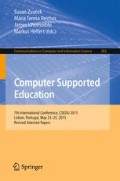Abstract
This work presents an intelligent tutoring system that supports personalized learning especially in a distance learning setting. The proposed architecture is based on multi-agents which facilitate the communication between the different components and on ontologies that provide a sound and complete representation of the knowledge domain. The operational procedure of the multi-agent system is described and the overall functions of its fundamental components are illustrated. The prototype, called APLe, provides dynamic learning path sequencing in a bottom up fashion using direct information about the student preferences or learning styles and relative information about the student learning process as part of a group. The preliminary evaluation of our system indicated positive feedback by the users in terms of the usability of the system, completeness of the educational content and ability of the system to adapt to the individual’s educational needs and preferences and informed for further developments required.
Access this chapter
Tax calculation will be finalised at checkout
Purchases are for personal use only
References
Polson, M., Richardson, J.: Foundations of Intelligent Tutoring Systems. Lawrence Erlbaum Associates, Mahwah, New Jersey (1988)
Nkambou, R., Mizoguchi, R., Bourdeau, J.: Advances in Intelligent Tutoring Systems. Springer, Heidelberg (2010)
Sossa, H., Peña Ayala, A.: Semantic representation and management of student models: an approach to adapt lecture sequencing to enhance learning. In: Sidorov, G., Hernández Aguirre, A., Reyes García, C.A. (eds.) MICAI 2010, Part I. LNCS, vol. 6437, pp. 175–186. Springer, Heidelberg (2010)
Bellifemine, F., Caire, G., Pogg, A., Rimassa, G.: Jade a white paper. Telecom Italia EXP Mag. 3(3), 6–19 (2003)
Noy, N., McGuiness, D.: Ontology development 101: a guide to creating your first ontology. Stanford Knowledge Systems Laboratory Technical report KSL-01-05 and Stanford Medical Informatics Technical report SMi-2001-0880 (2001)
McGuinness, D.L, van Harmelen, F.: OWL web ontology language overview W3C recommendation (2004). http://www.w3.org/TR/owl-features/
Smythe, C., Tansey, F., Robson, R.: IMS Learner Information Package Information Model Specification, IMS Global Learning Consortium. http://www.imsglobal.org/profiles/lipinfo01.html
LTSC Learner Model Working Group of the IEEE 2000. Draft Standard for Learning Technology - Public and Private Information (PAPI) for Learners (PAPI Learner), p. 1484.2/d7. IEEE, 28-11-2000
Fleming, N.D., Mills, C.: Helping students understand how they learn. The Teaching Professor, vol. 7(4), Magma Publications, Madison, Wisconsin, USA (1992)
Nikolopoulos, G., Solomou, G., Pierrakeas, C., Kameas, A.: Modeling the characteristics of a learning object for use within e-Learning applications. In: 5th Balkan Conference in Informatics, pp. 112–117. ACM, New York (2012)
Kameas, A., Pierrakeas, C., Kalou, A., Nikolopoulos, G.: Creating a LO metadata profile for distance learning: an ontological approach. In: Dodero, J.M., Palomo-Duarte, M., Karampiperis, P. (eds.) MTSR 2012. CCIS, vol. 343, pp. 37–48. Springer, Heidelberg (2012)
Bologna Working Group, A Framework for Qualifications of the European Higher Education Area. http://ecahe.eu/w/images/7/76/A_Framework_for_Qualifications_for_the_European_Higher_Education_Area.pdf
Anderson, L.W., Krathwohl, D.R., Bloom, B.S.: A Taxonomy for Learning, Teaching, and Assessing: A Revision of Bloom’s Taxonomy of Educational Objectives. Longman, London (2001)
Kalou, A., Solomou, G., Pierrakeas, C., Kameas, A.: An ontology model for building, classifying and using learning outcomes. In: 12th IEEE International Conference on Advanced Learning Technologies, pp. 61–65. IEEE, New York (2012)
Panagiotopoulos, I., Pierrakeas, C., Kameas, A., Kalou, A.: An ontological approach for domain knowledge modeling and management in e-learning Systems. In: Iliadis, L., Maglogiannis, I., Papadopoulos, H., Karatzas, K., Sioutas, S. (eds.) Artificial Intelligence Applications and Innovations, Part II. IFIP AICT, vol. 382, pp. 95–104. Springer, Heidelberg (2012)
Nikolopoulos, G., Solomou, G., Pierrakeas, C., Kameas, A.: An instructional design methodology for building distance learning courses. In: 7th International Conference in Open and Distance (2013)
Foundation for Intelligent Physical Agents (FIPA). FIPA ACL Message Structure Specification (2002). http://www.fipa.org/specs/fipa00061/
Bishop, B., Kiryakov, A., Ognyanoff, D., Peikov, I., Tashev, Z., Velkov, R.: OWLIM: a family of scalable semantic repositories. Semant. Web 2(1), 33–42 (2011)
Popham, W.J.: Transformative assessment in action: an inside look at applying the process. ASCD, Alexandria, USA (2011)
Brooks, R.A.: Intelligence without representation. Artif. Intell. 47, 139–159 (1991)
Bokhari, M., Ahmad, S.: Multi-agent based e-learning systems: a comparative study. In: 2014 International Conference on Information and Communication Technology for Competitive Strategies. ACM, New York (2014)
Ali, A.P., Dehghan, H., Gholampour, J.: An agent based multilayered architecture for E-learning system. In: 2nd International Conference on E-Learning and E-Teaching (ICELET), pp. 22–26. IEEE, New York (2010)
Dung, Q.P., Florea, M.A.: An Architecture and a domain ontology for personalized multi-agent e-Learning systems. In: 3rd International Conference on Knowledge and Systems Engineering, pp. 181–185. IEEE, New York (2011)
Hammami, S., Mathkour, H., Al-Mosallam, E.A.: A multi-agent architecture for adaptive E-learning systems using a blackboard agent. In: 2nd IEEE International Conference on Computer Science and Information Technology, pp. 184–188. IEEE, New York (2009)
Acampora, G., Loia, V., Gaeta, M.: Exploring e-Learning knowledge through ontological memetic agents. IEEE Comput. Intell. Mag. 5(2), 66–77 (2010)
Yaghmaie, M., Bahreininejad, A.: A context-aware adaptive learning system using agents. Expert Syst. Appl. 38(4), 3280–3286 (2011)
Acknowledgements
This Research Has Been Co-Financed by the European Union (European Social Fund – ESF) and Greek National Funds through the Operational Program “Education and Lifelong Learning” of the National Strategic Reference Framework (NSRF) (Funding Program: “HOU”).
Author information
Authors and Affiliations
Corresponding author
Editor information
Editors and Affiliations
Rights and permissions
Copyright information
© 2016 Springer International Publishing Switzerland
About this paper
Cite this paper
Panagiotis, S., Ioannis, P., Christos, G., Achilles, K. (2016). APLe: Agents for Personalized Learning in Distance Learning. In: Zvacek, S., Restivo, M., Uhomoibhi, J., Helfert, M. (eds) Computer Supported Education. CSEDU 2015. Communications in Computer and Information Science, vol 583. Springer, Cham. https://doi.org/10.1007/978-3-319-29585-5_3
Download citation
DOI: https://doi.org/10.1007/978-3-319-29585-5_3
Published:
Publisher Name: Springer, Cham
Print ISBN: 978-3-319-29584-8
Online ISBN: 978-3-319-29585-5
eBook Packages: Computer ScienceComputer Science (R0)

